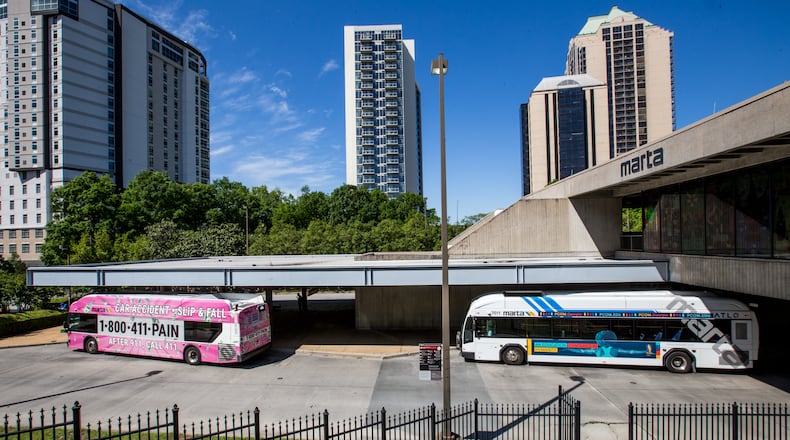Metro Atlanta transit agencies have cut service and bled red ink for weeks amid the coronavirus pandemic.
Now, with Georgia slowly reopening, transit ridership has stabilized, and several agencies are making tentative plans to restore some service. But full service may not be restored for months. And social distancing and other safety precautions will be the new "normal" indefinitely, transit officials say.
“I expect service to return to our pre-pandemic levels when the risk to public safety does,” said Collie Greenwood, MARTA’s chief of bus operations. “It’s not like we need to wait until everything’s fine. We can incrementally grow our service.”
Service can't be restored fast enough for residents who depend on transit to get around. Yvonne Barber of Fairburn has had a tough time getting to the grocery store and pharmacy since MARTA eliminated most of its bus routes last month.
“Just to gut the buses, it’s just devastating,” Barber said. “It puts people more in a crisis.”
“Crisis” is a good word to describe the current environment for public transportation. As schools and businesses closed beginning in March, the number of passengers dwindled.
At MARTA, bus ridership fell 45 percent, while the number of rail passengers plummeted by three quarters. Other local transit agencies saw similar declines.
As ridership fell, so did fare-box revenue. With much of the economy shut down, sales-tax revenue also tanked.
And with many economists predicting a long recovery, financial problems could linger for years – just as they did after the Great Recession a decade ago. MARTA recently projected a $380 million budget deficit over the next five years.
Federal aid will help – Georgia transit agencies received a $522 million infusion of cash from recent legislation, with MARTA getting a $298.6 million share. The agency will spend that money to help balance its budget over three years, though deficits are expected to rise quickly after that.
Even as revenue fell, expenses for protecting workers and passengers rose. Local agencies stepped up the cleaning of buses, trains and stations. They bought protective equipment for employees. And they took extraordinary measures to encourage social distancing and to separate bus passengers from drivers – blocking off rows of seats and boarding passengers at the rear door.
As passengers disappeared, agencies cut service to reflect the new reality.
Gwinnett County Transit and CobbLinc reduced or eliminated commuter bus routes into Atlanta and other commercial districts. Xpress bus, the state commuter bus system, scaled back the frequency of service.
MARTA reduced the frequency of trains and eventually eliminated most of its 110 bus routes, focusing service on the 40 busiest corridors and routes serving hospitals and other critical services.
In recent weeks agencies said ridership has stabilized or increased slightly as Gov. Brian Kemp eased restrictions on businesses and social gatherings. Now some agencies are making plans to restore service – albeit slowly.
Xpress bus will restore about 5 percent of the service it had cut beginning June 1, said Chris Tomlinson, executive director of the agency that operates the service. He said the agency is studying ridership on different routes and consulting with major employers about their plans to reopen. Xpress expects to announce details of the service expansion soon.
Gwinnett also plans to restore some commuter service at the beginning of June.
“We think we’ve just got to put some partial service out there and see how many of our express riders come back,” Gwinnett Transportation Director Alan Chapman said.
CobbLinc said it has no timetable for restoring service. But MARTA has restored one bus route – Route 124/Pleasantdale Road, which connects its Doraville station to Tucker.
Though MARTA has no timetable for restoring additional bus lines, Greenwood said the agency evaluates routes daily. When conditions allow, he said several routes – 180 and 181 in the Fairburn area and 165 on the west side of Atlanta – are top priorities because they serve many low-income residents.
That’s good news to Barber. She relies on Routes 180 and 181 to get around. In recent weeks, she’s had to catch rides to the College Park rail station to get where she needs to go. She said she lives on Social Security and can’t afford to take Uber or Lyft often.
“The solution is to restore service back to where they were,” Barber said.
Local transit agencies are not likely to restore full service any time soon.
“It’s probably too early to say,” Tomlinson said. “I believe it will be measured it months, not weeks.”
As service is restored, social distancing and other precautions will continue. Tomlinson said transit agencies must convince former riders that it’s safe to come back.
“A lot of things that, two months ago, seemed like extraordinary measures will become the standard going forward,” he said.
About the Author
Keep Reading
The Latest
Featured


